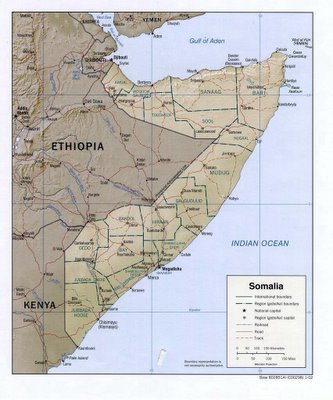
UN ReliefWeb report on, among other things, the impact of the Somali pirates on aid flow (or not) to the people of Somalia here:
Continued sea piracy along the Somali coastline is impacting on humanitarian supply pipelines into southern Somalia. Because of hijackings, WFP's food aid stocks in the country are at an all-time low and for the first time in almost five years, the Agency has had to transport food aid into Somalia overland through Kenya. Given the already challenging operational environment in southern Somalia where insecurity dictates the restricted nature of access, the implications of piracy pose an added obstacle to meeting the needs of highly vulnerable populations. Furthermore, these developments are coming at a time when the humanitarian situation in south central is getting worse and the number of those in need is increasing...While some have questioned whether the issue of taking on the pirates is being driven by the maritime insurance carriers, my view is that the interim Somali government needs to take a number of drastic steps to establish some control over its sovereign water.
...Incidences of sea piracy continued this month off the Somali coast. Three Taiwanese fishing vessels (and the 47 crew members) hijacked in June 2005 are still held hostage on the island of Koyaama, southwest of Kismayo. Various other ships were hijacked and held until unspecified ransoms were paid to the pirates. On 5 November, the luxury cruise liner "Seaborne Spirit", managed to outrun pirates some 100 nautical miles off the coast of Puntland. Several sources claim a "mother ship" is directing the attacks by the smaller speedboats, including the Kenyan Seafarers' Association which appealed for more information to track the ship down.
The UN remains highly concerned about the humanitarian implications of continued piracy as they affect supply pipelines into Somalia, particularly food and fuel. As an alternative option for relief food delivery, for the first time in almost five years, WFP has started to transport food overland through Kenya to target beneficiaries in southern Somalia. A convoy of 18 trucks carrying 500 metric tons (MT) of food arrived successfully in Wajid, Bakool region on 4 December. Still, the 1,200 kilometer journey through Kenya is not an easy one and trucks had to pass through 25 militia checkpoints once in Somalia. It is also 25-30% cheaper to bring food aid in by sea than it is overland and boats can carry more. So far, supplies to northern Somalia are not affected but the UN is seeking ways of addressing the issue, particularly at a time when the humanitarian situation in southern Somalia appears to be worsening. The TFG has meanwhile reportedly signed a two year deal with "Topcat Marine Security" to safeguard the Somali coastline.
The UN, as usual, is a pretty weak vessel for taking such action because it has no military forces of its own to commit to thwart the pirates. It seems logical to me that the UN should continue to send food by ships, albeit ships escorted by naval vessels. I think the French, Germans, Dutch and South African navies have the right warships to accomplish such an escort mission.
What is missing is the political will to commit forces once again to the failed state of Somalia for fear of being dragged back into the on-going conflict. However, if there is ever to be a situation in which the UN should undertake a determined show of force, it is in Somalia. It is a "broken window" that urgently needs fixing before it spawns even more trouble for its neighbors and the international commerce that flows off its shores. This is a case of the need for "nation-building" as strong as those undertaken in the past by the US Marines as set out so well in Max Boot's book, The Savage Wars of Peace: Small Wars and the Rise of American Power and by the British in their colonial work. Kenya is already feeling the impact of the disorder to its north, as noted here, here, here and here. In the last post, I noted
Somalia is a major regional problem and needs to be addressed sooner rather than later....The Indian Ocean port of Mombasa is a major shipment point for coffee and tea exports for Kenya -- two of the biggest foreign exchange earners.
It is also a key gateway for imports and exports to Uganda, Burundi, Rwanda, eastern Congo, southern Sudan and Ethiopia.
I would expect that Uganda, Burundi, Rwanda, eastern Congo, southern Sudan, and Ethiopia will experience a "ripple effect" of increasing costs.
UPDATE:

The South African Navy has just the type of ship I think would be an excellent escort here.

No comments:
Post a Comment